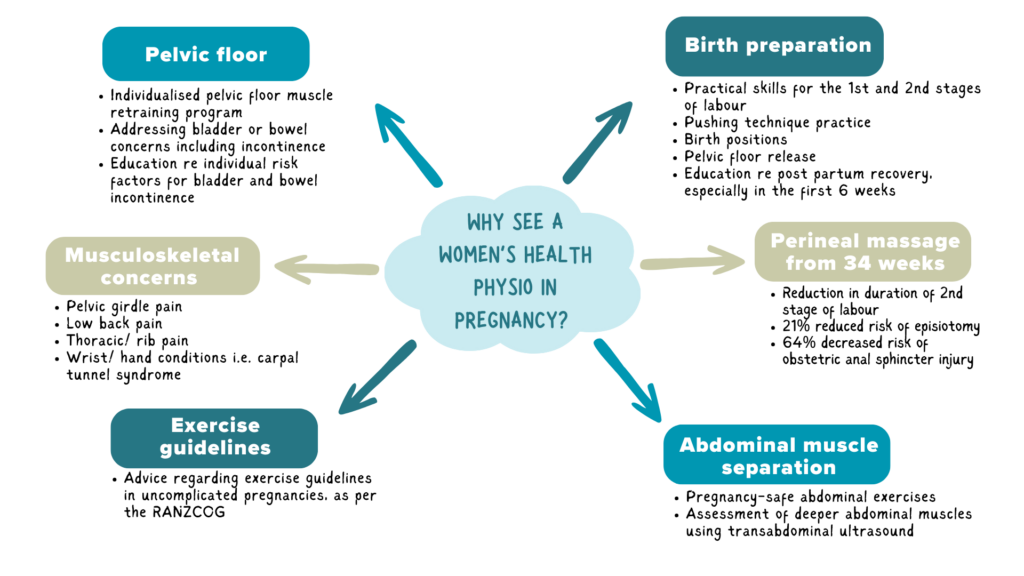Leaking when you cough or laugh, struggling with constipation or feeling a little heavy at your vagina? These are all common symptoms that you may be experiencing during pregnancy. They are also symptoms that can be related to your pelvic floor muscle function. You may have been told by your obstetrician, midwife or GP, to see a specialist pelvic health physio for a pelvic floor assessment during pregnancy and like many, you aren’t quite sure what this involves.
As a pelvic health physiotherapist, I spend a great deal of time educating patients and their partners about the pelvic floor including and the profound effect pregnancy can have on your pelvic floor. Your pelvic floor muscles function by squeezing around the urethra, vaginal opening and anus, as well as lifting the internal organs of the pelvis. Conversely, letting go of your pelvic floor muscles facilitates emptying of your bladder and bowel. It is the let go of your pelvic floor muscles that is important when it comes to delivering your baby vaginally and we know your pelvic floor muscles can stretch up to 3x their resting length during delivery.

The Alana approach
Here at Alana, we tend to recommend a pelvic floor assessment with one of our pelvic health physiotherapists once you are over 20 weeks pregnant. This assessment will give us an idea of your pelvic floor muscles power, endurance and coordination. Based off this assessment, we will be able to provide you with an individualised pelvic floor muscle retraining program. We know that those who experience bladder or bowel incontinence during pregnancy, are at an increased risk of incontinence post partum. If this isn’t a good enough reason alone to do your pelvic floor exercises, recent research also tells us that pelvic floor muscle retraining reduces the duration of your second stage of labour, i.e. the pushing stage (Sobhgol et al 2022).
From 34 weeks, your pelvic health physio can work with you to start preparing for labour and delivery. If you are planning to have a vaginal delivery, this can include starting perineal massage from 34 weeks (assuming you have been cleared to start this by your obstetrician, midwife or GP). We know that perineal massage reduces the duration of your second stage of labour, reduces your risk of an episiotomy by 21% and reduces your risk of an obstetric anal sphincter injury (OASI) by 64% (Abdelhakim 2020). Your pelvic health physio will also measure the length of your perineal body (i.e. the distance between the bottom of your vaginal opening to your anal sphincter). This measure is important, as a short perineal body is one of the risk factors for an OASI (Geller et al 2014). We will practice pushing and educate you regarding the various birth positions that you may find helpful during labour. For those anticipating a caesarean section, your pelvic health physio can start the process of educating you regarding abdominal wall and scar recovery post partum.
But wait, there’s more……
Pelvic health physio’s are not just interested in your pelvic floor! Like your usual physio, we also treat various musculoskeletal concerns including pelvic girdle pain, low back pain or wrist and hand conditions such as carpal tunnel; all of which can be common during pregnancy. We can provide pregnancy specific exercise guidelines, including pregnancy safe abdominal exercises.
If you are interested in seeing one of our specialist pelvic health physiotherapists, please don’t hesitate to call our friendly team on 9009 5255 or get in touch via our Contact Form.